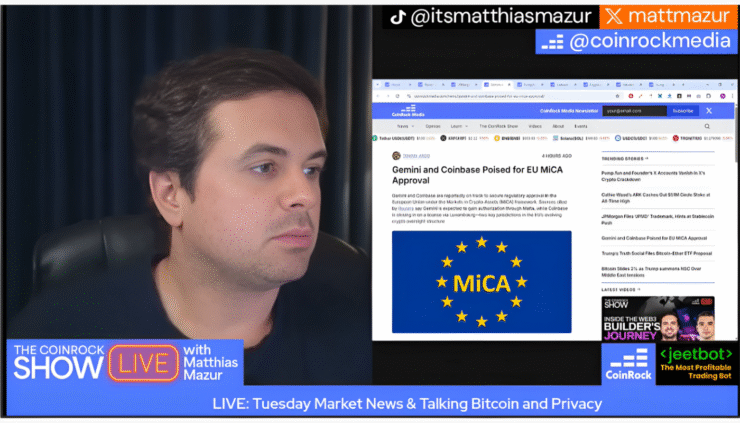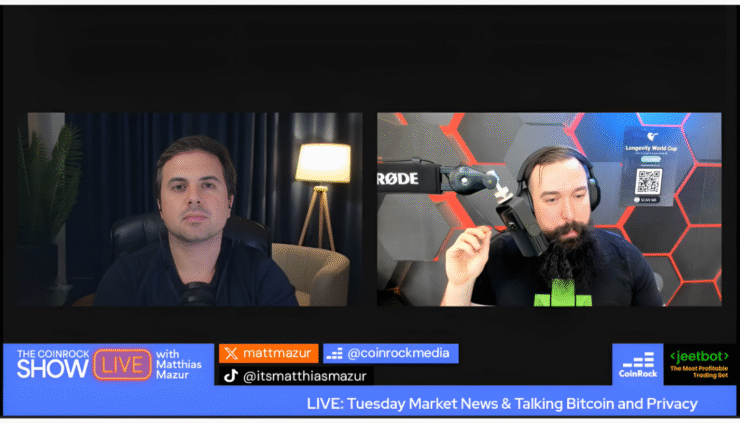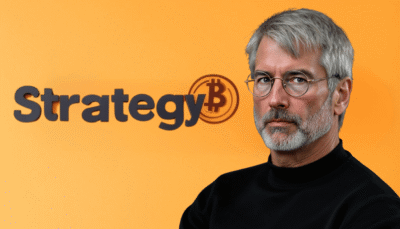The latest episode of The CoinRock Show opened with a tense but grounded market rundown from host Matthias. Despite global fears fueled by escalating conflict in the Middle East—especially between Iran and Israel—crypto markets showed surprising resilience. Bitcoin sat around $105K, Ethereum at $2,500, and Solana near $150, holding firm even amid talk of war and rising geopolitical anxiety.
“If you told anyone in the 2022 bear market that we’d be facing a near-hot war in 2025 and Bitcoin would still be above $100K, they’d sign up in a heartbeat,” Matthias remarked.
He touched on the fatigue spreading across social media, the dangers of propaganda, and the mental toll of constant exposure to fear-driven headlines. As mainstream media spirals, he offered one tip: mute what doesn’t serve you.
“Despite the noise,” he said,
“The builders aren’t sleeping. Institutional players are still moving. The market is holding.”
It was the perfect setup for the episode’s guest—one of Bitcoin’s most respected (and anonymous) minds, a relentless advocate for privacy and personal sovereignty: nopara73.

The Original Anon Dev: Meet Nopara73
This week’s guest flipped the script—literally. Before host Matthias could even begin, the pseudonymous privacy pioneer nopara73 took the mic with a question of his own:
“What is CoinRock, and why are you doing this?”
It was a fitting entrance. For a man who’s spent years questioning financial surveillance, institutional control, and the very fabric of aging, it made sense that he’d start by interrogating the format itself.
Best known as the creator of Wasabi Wallet, a leading privacy-enhancing Bitcoin wallet built on coinjoin technology, nopara has long stood at the frontline of digital sovereignty. He also co-authored Programming Bitcoin, a hands-on guide that teaches developers to build Bitcoin from scratch using Python.
But as he revealed during the episode, the toll of building privacy tools in a world of surveillance was steep. Government pressure, corporate censorship, and even family-level harassment forced him to step back—and eventually walk away from the very project he helped pioneer.
“After a decade of working on Bitcoin privacy, I learned,” he said.
“I wouldn’t say the hard way, because there are Bitcoin privacy developers who learned in a really hard way that larger violence organizations like governments do not like it if their citizens have a money that cannot be traced.”
Today, he’s launched an entirely new chapter with the Longevity World Cup—a science-driven global competition where reversing biological age is the goal. For nopara, the shift from Bitcoin privacy to healthspan hacking is more of a natural evolution than a pivot.
As he put it:
“longevity World Cup where people are competing with each other who can reverse their age the most.”
Host Matthias, spurred into the Longevity discussion:
“I think with age, everyone starts looking more into like, how not to die,” he said.
Why Privacy Still Matters
The conversation began with Bitcoin’s roots—specifically, its original promise of anonymity. Nopara, who started building Wasabi Wallet in response to Bitcoin’s increasingly traceable nature, argued that privacy is not a luxury—it’s a prerequisite for freedom.
Before founding Wasabi Wallet or diving into Bitcoin privacy, nopara73 was simply a curious developer with time on his hands and a hunger to learn. That changed when he sent a cold email to Nicolas Dorier—creator of BTC Pay and one of the leading minds in Bitcoin development.
“I offered to work for free,” he recalled.
“A few months later, I was on a plane to Japan.”
That trip became a turning point. In Japan, nopara began working on a Bitcoin library in C#, which eventually led him to rewrite and simplify Programming the Blockchain, a technical guide that broke Bitcoin down into code for developers. This deep technical immersion made the leap to wallet-building a natural next step.
But what really shaped his vision was a Reddit post about JoinMarket—a powerful but intimidating privacy tool without a user interface.
“I’m looking at it, and this thing doesn’t have a user interface. And people are super excited about it. I’m like, what the heck is going on here?…And that’s when I realized the demand for privacy.”
Inspired, he began building Wasabi Wallet, designed from the ground up for users who wanted anonymity in Bitcoin transactions. His mission? To make privacy not just available, but accessible.
“We have this Prussian schooling system where kids sit and shut up for eight years, then we expect them to do something valuable. But the real way to learn is through apprenticeship—learning by doing, learning from a master,” he said, reflecting on the unconventional path that led him to crypto.
It wasn’t just technical curiosity or ideology—it was the conviction that privacy was foundational to what Bitcoin was meant to be. That conviction would define the next decade of his life.

Bitcoin, CBDCs, and the Road to Hyperbitcoinization
As the conversation shifted toward CBDCs, nopara didn’t hold back. While he acknowledged that a well-designed central bank digital currency could theoretically offer instant, anonymous payments, he made one thing clear:
“I think having to wait for a wire transfer today at 8 p.m. or the weekends, banks being closed is ridiculous in today’s day and age.”
“In theory, being able to send money immediately, quickly, with no, almost in a trustless way, or at least in a government guaranteed way, which in this case, you know, it opens up a lot of potential for catastrophic scenarios.”
He pointed to projects like David Chaum’s Elixxir—a modern take on Chaumian e-cash—that still couldn’t escape compromises like identity checks. Even with the best intentions, centralized control always seems to creep back in.
The conversation turned to Bitcoin itself. Despite adoption and price surges, nopara voiced some disappointment.
“We haven’t really improved the core protocol in years,” he said.
“The dream was always about money that’s private, instant, and free to move. We’re not there yet.”
While stablecoins have filled some gaps—especially for users who aren’t into Bitcoin—he argued they still leave the power to print money in the hands of a few.
“Let’s not call them criminals,” he quipped,
“just a group of people who can create money out of thin air.”
But for him, Bitcoin still holds the long-term edge. He described an eventual “inflection point”—a moment where Bitcoin becomes so dominant that it reshapes the entire economy. That, he said, is hyperbitcoinization.
“If there’s a better store of value—one that’s abstract, stable, and doesn’t require you to buy real estate just to preserve wealth—people will move to it. That’s Bitcoin.”
In his view, that outcome is no longer a distant fantasy. It’s just a matter of time.
Identity Is the New Frontier
Throughout the episode, what stood out most was the consistency of Nopara’s worldview. Whether talking about blockchain surveillance or the biomarkers of aging, he returns to a single principle: autonomy.
This philosophy shows up in his work, his lifestyle, and even his decision to remain pseudonymous.
It’s not about paranoia—it’s about agency. It’s about choosing when, where, and how to be seen.
What do Bitcoin privacy and biological age have in common?
Everything, if you ask Nopara.
Both are systems that define who we are. Both can be hacked, gamed, and reimagined. And both are, in their own way, battles for time—whether digital time on a blockchain or cellular time within your body.
The episode ends not with a call to buy or build—but with a quiet challenge: reclaim your time, your privacy, your self.
Because in a world where everything is tracked, sold, and optimized—anonymity might just be the ultimate luxury.
Where to Find Nopara73
Stay updated on Nopara’s work and dive into his latest projects:
- Twitter/X: @nopara73
- Project: longevityworldcup.com
- YouTube: youtube.com/nopara73
- Learn More: Wasabi Wallet




